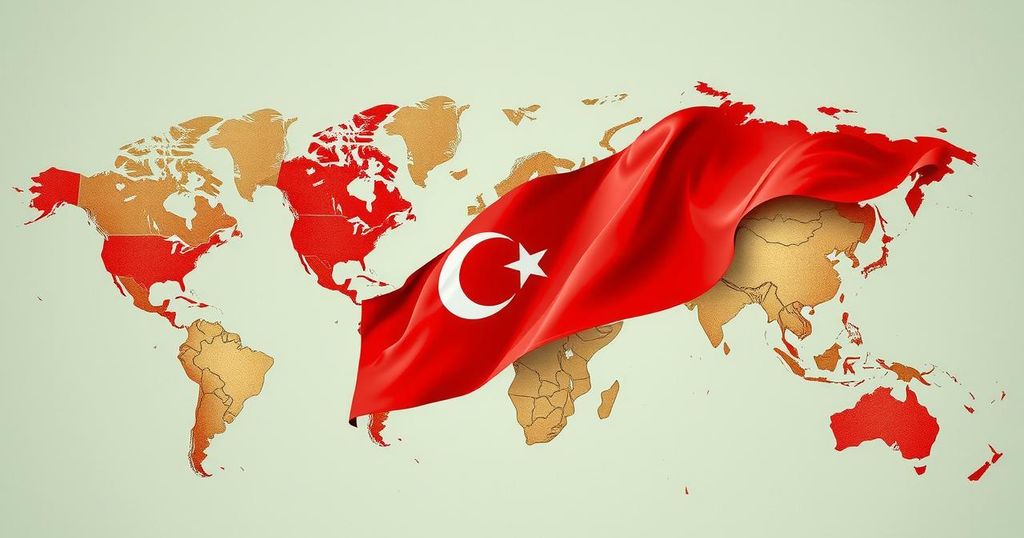Türkiye has emerged as a significant mediator in international diplomacy, highlighted by its recent role in de-escalating tensions between Somalia and Ethiopia. Through the Ankara Declaration, Türkiye facilitated crucial dialogue that addressed each nation’s vital interests while preventing potential conflict in the Horn of Africa. The country’s broader commitments to mediating other global conflicts demonstrate its ongoing dedication to stability and constructive diplomacy in an increasingly complex world.
In an era marked by rising global tensions and unresolved conflicts, Türkiye’s role as a mediator has emerged prominently, particularly in the recent resolution of tensions between Somalia and Ethiopia. This diplomatic success underscores Türkiye’s commitment to fostering stability within a complicated geopolitical landscape. The core of the dispute centered on Ethiopia’s decision to lease Berbera Port in “Somaliland,” a territory recognized solely by Ethiopia, leading Somalia to perceive it as a threat to its sovereignty.
The involvement of Türkiye, which mediates as a neutral party, prevented a potentially destructive conflict that could destabilize the Horn of Africa. The Ankara Declaration, facilitated by Türkiye, illustrates a diplomatic approach characterized by mutual respect and pragmatic dialogue, allowing both nations to express their core interests. Ethiopia, reliant on immediate access to the port for trade, and Somalia, concerned about its territorial integrity, both found a path toward dialogue through Türkiye’s diplomatic engagement.
The effectiveness of Türkiye’s mediation is not an isolated case; it reflects a decade-long commitment to resolving international disputes with concrete outcomes. In addressing issues like the Ukrainian conflict, Türkiye has established itself as a platform for dialogue, preventing potential crises, such as a food shortage, through initiatives like the Black Sea Grain Initiative.
President Recep Tayyip Erdoğan has been instrumental in steering Türkiye’s foreign policy towards actively embracing mediation roles, with Hakan Fidan, the current Minister of Foreign Affairs, further enhancing these strategies. Their joint efforts illustrate Türkiye’s multifaceted approach to international relations, which emphasizes both regional stability and bilateral cooperation.
Türkiye’s endeavors in the Syrian civil war highlight its capacity to navigate complex issues while simultaneously bringing attention to the ongoing humanitarian challenges. Through dialogues, negotiations, and providing refuge to the displaced, Türkiye has showcased dedication to maintaining regional stability amid turmoil.
The successful signing of the Somali-Ethiopian agreement sheds light on the complexities of diplomacy; maintaining the progress of the Ankara Declaration will demand Türkiye’s ongoing mediation and careful navigation of the underlying tensions. The distinct geopolitical interests of both Somalia and Ethiopia make sustaining this progress a significant challenge.
As Türkiye’s influence grows on the international stage, the issue of balancing impartiality and influence arises. The integrity of Türkiye as a neutral mediator may encounter tests as it continues to engage in intricate conflicts. Despite its achievements in fostering trust, the complexities inherent in its mediatory engagements require careful management.
Ultimately, Türkiye’s diplomatic approach advocates for dialogue and practical resolutions over assertive domination, establishing it as a pragmatic force in international diplomacy. Its conflict resolution strategies in various contexts, such as the Somali-Ethiopian dispute and broader conflicts like those in Ukraine and Syria, validate the principles of constructive engagement. Dr. Kaan Devecioğlu noted, “Türkiye’s neutral, constructive, and inclusive approach was pivotal to achieving this success.” By prioritizing dialogue as a fundamental tool for peace, Türkiye is actively shaping a legacy of conflict resolution that emphasizes the necessity of diplomacy in an increasingly fragmented world.
Türkiye has increasingly positioned itself as a significant player in international diplomacy, often stepping into roles traditionally held by larger powers. With complex geopolitical tensions affecting regions like the Horn of Africa and beyond, Türkiye’s mediatory actions have both fostered dialogue and mitigated potential conflicts. Recognizing the balance between regional interests and sovereignty concerns is essential to understanding Türkiye’s strategic diplomatic initiatives. The resolution between Somalia and Ethiopia is a case study in how Türkiye applies its broader diplomatic philosophy in practice, which combines both respect for sovereignty with pragmatic solutions to avoid conflicts. Over the past decade, Türkiye has demonstrated a consistent commitment to international mediation, drawing from its historical relationships and strategic interests across different regions. The integration of diplomacy into its foreign policy is spearheaded by prominent leaders, including President Erdoğan and Hakan Fidan, which illustrates Türkiye’s emphasis on establishing itself as a key mediator and advocate for stability.
In conclusion, Türkiye’s mediatory role between Somalia and Ethiopia exemplifies its strategic commitment to fostering stability in a tumultuous global environment. Its ability to navigate complex geopolitical landscapes through impartial diplomacy highlights Türkiye’s potential as an essential mediator in international relations. While sustaining such diplomatic successes will host its own challenges, Türkiye’s forward-thinking approach emphasizes dialogue as a vital component of modern diplomacy, ultimately shaping a legacy of conflict resolution. Through these efforts, Türkiye underscores the importance of constructive engagement in achieving lasting peace.
Original Source: www.dailysabah.com






